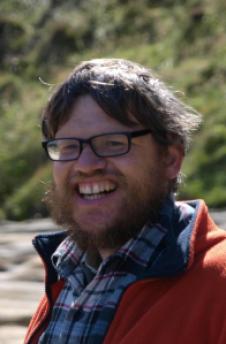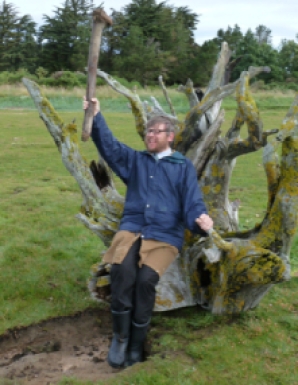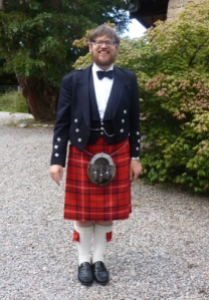 Tom Rose is an odd fellow. He’s also a precious one.
Tom Rose is an odd fellow. He’s also a precious one.
I met Tom almost immediately after I arrived at Findhorn this last week. With a scraggly beard, pronounced teeth, and thick glasses a bit cloudy from mist or dirt or both, he greeted each member of our group enthusiastically. Eager or perhaps nervous to make connections, he spoke with a super-articulated, demonstrably British accent.[1] His distinctive character made me feel like I had landed somewhere between Wallace and Gromit and a Monty Python skit.
We learned in one of our first group meetings that, thirty-three years ago, Tom had had some trouble getting enough oxygen during his birth. As a result, he had had to face all sorts of challenges throughout his life. We also found out that he had grown up at Findhorn and was a dearly loved member of the community. Though his confidence and ability for speaking in group settings remained limited, Tom had attended and contributed to many programs over the years. I appreciated the way that Craig, our facilitator, spoke kindly and directly about the situation. I also respected that Tom appeared a bit calmed to have the news made public: no plea for pity, only honest recognition.
From the start, I intuited that Tom and I would hit it off. For one, he loves to play with words and accents. When I asked if he would mind if I tried to learn his accent, he said he’d actually like that. When I offered to teach him my American accent, he said he’d like that too. We spent loads of time at dinner, on the bus, or walking between locations simply speaking samples back and forth. He insisted that the “h” in “herbs” deserved full pronunciation and that “been” should sound like “bean.” I gave him tips for languid southern drawls and dusty cowboy warnings. Inevitably, each successful experiment would elicit a joyful cry of “Yes! Yes! That’s it!” At times, I wondered if I were being inappropriate–was I making fun of rather than having fun with?–but Tom insisted he knew and enjoyed the game: “Some people think I wouldn’t like people noticing my awk-cent, but it’s just the way I speak. There’s nothing wrawng with it.”
We also laughed all week over an incident that happened early on. I had gone up for seconds on pizza at 6:20 but was rebuffed by the line keeper who informed me that seconds would not be served until 6:30. When I got back to the table, Tom secretly whispered in playful outrage, acknowledging the injustice I’d suffered. Isabella, one of our group mates mentioned that she’d been thinking about going up for seconds. “Go for it,” I said. “You’re a lot better looking than I am. Maybe you’ll have better luck.” Joining the game, Isabella went on up and, sure enough, she sailed right through. As did Julie who followed her. And Katarin. Each time one of them got back to the table, Tom and I shook our heads and howled in disbelief.
From that point on, we plotted to overthrow the tyrant in whatever way we could. Or we scouted which other ticket-takers might prove more amenable to an early run on added portions. When Tom wore a military shirt one day, we decided which of us would be General Nuisance and which would be Major Faux Pas (his names) when we enacted our uprising. Later, he opted to just be called “General Tom.”
Another day, we found some ridiculous plastic teeth left behind at a campfire below some seaside cliffs. I chirped “Hey, Tom, you’ve left your dentures behind,” and then, realizing that my joke might be misunderstood, amended it to “Actually, it was me. I left mine here last night.” He fervently insisted I shouldn’t put the teeth in my mouth but when I lifted them closer, he almost fell backward, delighted by the grossness of the gag. Later that night at dinner, after I’d thoroughly cleaned the teeth back in my room, I surprised him with an enthusiastic, plastic-toothy greeting–and that one actually sent him reeling.
As it turned out, the program did often get challenging for Tom. He tensed considerably whenever asked to speak, sometimes even hours ahead in anticipation. Whenever the talking stone came his way, he would rub his hands and almost stutter a bit, even though he showed no such hesitation at other times. It was simply the pressure of being on the spot. One night at dinner, I tried to coach him through the feelings a bit. “Would it help,Tom,” I asked, “if you knew that we cared about you and wanted to hear what you have to say?” He said that he thought it would and that night seemed a bit freer–though not yet fully unburdened–in expression..
Sometimes, the tension he felt was not even his own. Like a tuning fork, he vibrated in resonance to those of us around him. If we harbored unspoken resentment or disapproval–feelings that our wide diversity of personalities made predictable–Tom unconsciously picked up on it. Without the social “skill” of masking his emotions, Tom sometimes got overwhelmed and simply checked out, either falling asleep or leaving the room altogether. Whenever that happened, we always noticed his absence acutely.
That said, it became clear over the course of the seminar that Tom’s great sensitivity brought gifts as well as challenges. For one, he brought with him a catalyzing purity of intention. Yes, he took a certain kind of attention, but his openness and honesty made it difficult to continue with any charade. That he took care of his own needs gave us space to do the same for ourselves. Tom also brought a refreshing sense of wonder. We often made sculptures in front of the incoming tide, knowing full well that the ocean’s power would reclaim the works in short order.
In those first precious moments when the waves would reach our work, Tom would sit rapt in focused attention, laughing with an instinctual and infectious “Nooooooo!”
Towards the end of one midweek dinner, Tom quietly wandered to an adjacent table and pulled out a Japanese Shakuhachi flute and began to play soothing intuitive meditations. His music showed surprising subtlety, clear enough to be enjoyed without being so forceful as to intrude. When we had a music circle the next day–usually an adventure in cacophony with such a wide range of rhythmic and listening abilities–Tom found empty spaces in which to weave his notes. Again, he didn’t need to dominate, only to contribute.
By the end of the week, Tom had indeed come a bit further out of his shell. The last morning, we all worked together on a grand mandala on the beach, scurrying about for seaweed, rocks, and driftwood. Tom watched for much of the time, but also added in a small figure he had formed, placing it directly at the center of the wheel. That afternoon, he spoke concisely and eloquenly about why the week had been so hard for him, acknowledging his shyness and that, ten years after the fact, he still felt sad about suddenly having lost his Dad.
When evening came and we gathered for our final supper, Tom showed up in full Scottish regalia, kilt, vest and all. During dinner, he happily joined in conversation, lifting his glass of special strawberry champagne for every toast. As Tom prepared to head home for the final time, I asked if he felt comfortable with hugs, and he replied, “Yes, yes I do.”
As he embraced each of our groupmates in turn, it struck me that Tom had not only managed to survive the experience, but also had worked his way into our hearts. He had formed the connections he seemed so nervous to make only a week earlier. In simply being himself, he had blessed our circle. You’ve banished the tyrants, General Tom, and given us more than you know. Bloody brilliant, my friend. Bloody brilliant.
[1] Imagine the name “Tom” pronounced halfway–hahwfwhy–between “tome” and “tum”.





I found this post particularly touching, Ted. I imagine Tom is someone you will remember for a long time. And vice versa.
Thanks, Melissa. He was pretty remarkable.
Ted, I am missing a heart story of how your time at Findhorn was. I am surprised that you have not reflected on the energy at all. Was it disappointing? That was a pretty big commitment to go up there. I can’t get a sense of how it was for you.
It’s interesting that you pick up on that. For sure, there were ways that I left Findhorn feeling unfulfilled and I’ve so far chosen not to write about that perspective, both out of respect for the place and because I’ve had other wonders to concentrate on since then.
That said, my connection with Tom that I wrote about here and my connection with other colleagues there did have plenty of heart. That showed up more in small gestures of kindness than in grand overtures of insight, though.
Thanks for sharing your thoughts and provocations. I appreciate your reading along!
REALLY liked this entry. I’m several weeks behind but this one was so worth staying up late to read:) I’m proud to know you:)
Thanks, Jennifer. I’m honored that you’re reading and am so glad that you’re enjoying the posts. I’ll do my best to keep em coming.
Thanks Ted. As Tom’s mum I hear a little about how he gets on when he does a course like this but not in nearly so much detail. Although he did find it difficult, he also loved the week and you all as a group made this possible for him.
Mum has just read me this piece. It was really nice to listen to it. Thank you very much Ted.
Dear Ted!
Thank you sooo much!
I was touched by many things during my time in Findhorn, and one of them was by Tom. I often think, that if there is something special, it is better not to try to formulate it with words, because words will just simplify the experience and will make them unspecial…But you managed…:) When I read your writing, everything became so lively….I was smiling and experineced that special feeling about Tom and our group and Findhorn just as if I would have been there…Thank you for that!!! And also that you made that available to other people…
Thanks Katalin, I am Tom’s mum and shared Ted’s blog with many of my family and friends. It was such a delight for us to have Tom described and valued by others.To see him with fresh eyes.
For those of us close to him it is not always so easy to see even tho we love him dearly.
I’m so glad you liked this, Katalin. Tom added so much to my experience, too, and I wondered if writing about him would change my experience of his grace. I found it actually amplified it. Thanks for writing!